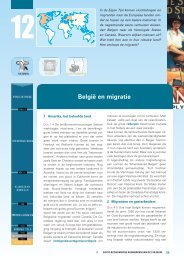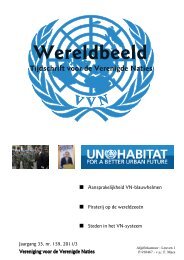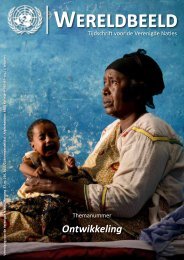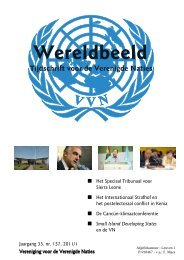Annex 5: United Nations Security Council Resolution 1874 (2009)
Annex 5: United Nations Security Council Resolution 1874 (2009)
Annex 5: United Nations Security Council Resolution 1874 (2009)
You also want an ePaper? Increase the reach of your titles
YUMPU automatically turns print PDFs into web optimized ePapers that Google loves.
including (relatively modest) economic support to North Korea. This change reflected the<br />
new Russian foreign policy that President Putin developed, trying to bring Russia back onto<br />
the political stage of the world’s powers. Good relations with the international ‘pariah<br />
regime’ in Pyongyang gave Russia a more influential position on the Korean Peninsula, and<br />
as such at international negotiations to resolve the region’s problems. As van der Meer<br />
accurately points out, Russia has several reasons to be eager to participate in the Six-Party Talks.<br />
First, Russia is a neighbouring state to North Korea. Although their common border is only<br />
some nineteen kilometres in length, Russia is sincerely concerned about instability along this<br />
border, not only by the possibility of war on the Korean Peninsula, but also by the chaos that<br />
is expected when the North Korean regime collapses. Russia objects to the development of<br />
nuclear weapons by North Korea for the same reason: a successful nuclear weapons’<br />
programme would only cause more regional instability, as well as a costly arms race in East<br />
Asia that Russia may need – but does not want – to join. Stability on the Korean peninsula is<br />
thus one of Russia’s main goals. Second, Russia also tries to use its role in the Six-Party Talks<br />
to re-establish its position as a superpower, in the East Asian region as well as globally. Part of<br />
this strategy is, of course, to counterbalance the role of the other superpowers, especially the<br />
<strong>United</strong> States but also China. Participation in the Six-Party Talks shows the world that Russia<br />
is taken seriously. And when there are any possibilities to downplay the influence of the<br />
<strong>United</strong> States in East Asia, Russia will gladly stimulate this. The more influence that Russia<br />
gains in the region the better, not only politically but also economically. Finally, the economic<br />
goals are not to be neglected either. Economic ties with South Korea are seen as highly<br />
profitable in Russia. By using North Korea as a bridgehead to South Korea, and with the aim<br />
of using South Korea in turn as a bridgehead to other East Asian countries such as Japan,<br />
Russia is trying to enlarge its economic leverage in Asia. Exporting energy and raw materials<br />
from Siberia to East Asia has been assessed as an important opportunity. Russia hopes that<br />
improving its political relations with especially South Korea – by means of supporting South<br />
Korean views within the Six-Party Talks as much as possible – will at the same time improve<br />
economic relations. Although Russian exports to South Korea have been rapidly growing in<br />
recent years (nowadays estimated to be worth around US$ 5 billion per year), Moscow hopes<br />
for much more. Considering the Russian role within the Six-Party Talks as ‘weak’ does not<br />
mean that it could also be earmarked as ‘unimportant’. From the <strong>United</strong> States’ point of<br />
view, this may seem the case, because the Russians were not very helpful during the<br />
negotiations. From the North Korean and Russian perspectives, however, the Russian role<br />
was important and even to some extent successful. Russia’s role within the international<br />
framework concerning North Korea will not easily change. Its somewhat opportunistic<br />
relationship with North Korea has thus far proven to be fruitful for both Russia and North<br />
Korea, so one may expect it to be continued (van der Meer, 2008).<br />
Canada & “The G-8 Global Partnership against the Spread of Weapons and<br />
Materials of Mass Destruction”<br />
Recently, Canada became involved since the DPRK’s newest missile can potentially reach<br />
Canadian territory. In its report of June <strong>2009</strong>, the International Crisis Group suggested that<br />
Canada could play a role in diminishing tensions (XXX, <strong>2009</strong>b: 24). The G-8 Global Partnership<br />
against the Spread of Weapons and Materials of Mass Destruction (Global Partnership) was<br />
established in June 2002 at the G-8 Summit in Kananaskis, Canada, with the objective of<br />
raising $20 billion over ten years to eliminate WMD threats through dismantlement and the<br />
employment of weapons scientists for peaceful purposes. The U.S. has pledged to provide at<br />
least $10 billion of the funding, and other industrialised countries have joined the effort.<br />
Until now, efforts have focused on the former Soviet Union, but the partnership is looking to<br />
expand its work to WMD programs in other countries, including the DPRK. Canada has taken<br />
a strong interest in the initiative and could approach North Korea and propose participation as a way<br />
to help Pyongyang meet its obligations in the Six-Party process.<br />
© <strong>2009</strong> – Dr. D. Criekemans – Negotiations in UNSC on the continuing security provocations by North Korea 25







